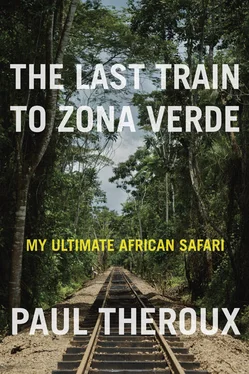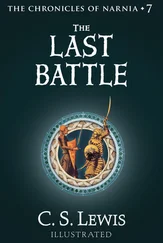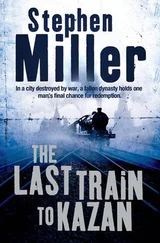But I have no idea what will happen to these sprawling cities and slum areas. My feeling has always been that the truth is prophetic, and if I write accurately about the present, seeing things as they are, aspects of the future will be suggested. I was somewhat heartened by the progress made in ten years in the townships of Cape Town, how the shantytowns and squatter camps had been upgraded to habitable settlements. This was largely due to the efforts of sympathetic and innovative well-wishers, both South African and foreign agencies: the installation of water and electricity, the improvement of houses and roads, the novelty of indoor plumbing, the building of schools.
I was enlightened. So this is how a city grows, how cities — something of a rarity in the early life of the populated world — have grown through history. It is impossible to say when the first city appeared on earth, and it is probably true, as the historian J. M. Roberts wrote, that “more than any other institution the city has provided the critical mass which produces civilization and that it has fostered innovation better than any other environment so far.” Africa is a showcase of cities in their messy infancy — dangerous, unhealthy, corrupt, lawless, improvisational, and still growing. Modernity is conspicuous in Africa nearly always as blight, the disfigurement of cities and landscapes, a great and overwhelming ugliness.
Yet the upgrading of a shantytown to a place of tidy huts is not the end of the story. There is no end. I knew that when, after my visits to Khayelitsha and Guguletu, I saw the new, exhausted, and wide-eyed arrivals from the provinces. In an unregulated country, mismanaged and badly governed, there is no limit to the growth of a slum. Every improved slum area attracts a new shantytown, every new shantytown attracts a squatter camp, every squatter camp attracts more people leaving their traditional homelands for an uncertain life in the city, among the multitudes of unemployed. There is a point beyond which squalor cannot sink any lower, or get any worse, and that is the point these African cities have reached. People live in them in a spirit of renunciation. An African city of this sort is an agglomeration of desperate people, a static mob that feels safer in its dense numbers.
“You didn’t see the wealthy areas!” I will be told. “You didn’t see the great houses!” But I did see them. I peeped through the perimeter walls and saw the sentry boxes, the private clubs, and the gated communities. I was welcomed in some of them, ate and drank in their delightful rooms — “Do have some more kudu carpaccio” — and I found that really these were tiny enclaves, mere precious islands in a sea of wreckage.
My horror interest in the futureless, dystopian, world-gone-wrong, Mad Max Africa of child soldiers, street gangs, reeking slums, refuse heaps, utter despair, misplaced belief, new-age cargo cults, and bungled rescue attempts — this horror interest is rooted in detachment. It is unworthy, no more than idle, slightly sickening curiosity over modernity in its most odious form, the sort that technology worsens by making people lazier and greedier, tantalizing them with visions of the unattainable, driving many of them to be refugees and bludgers in Europe and America. We have bestowed on Africa just enough of the disposable junk of the modern world to create in African cities a junkyard replica of the West, a mirror image of our own failures — but no better than that. Writing about it, choosing the urban landscape and urban misery as a subject, is something for an obituarist. Such a vision, or a visit, represents everything in travel I have always wished to escape.
I am not an Afro-pessimist, though. Apart from the obvious unchecked proliferation of people and the inevitable disappearance or extinction of wild animals, it is not certain what Africa’s future will be. But what is happening in Africa now is also happening with greater subtlety in the rest of the world: the diminution of resources, the vanishing of work, the growth of urban areas. The difference is that Africa’s population is growing much faster than that of any other continent. There are estimated to be a billion Africans now. Within four decades it will be two billion people — most of them living in cities, in countries without industry, without sufficient food or water or energy, countries that are poorly governed and insecure. It is projected that in a few years Nigeria will grow to a population of three hundred million, in an area the size of Arizona and New Mexico. Donor aid can take some credit for what little infrastructure exists. But donor aid and self-interested foreign governments and “rogue aid” from China and North Korea — money proffered with no questions about human rights — all these are largely responsible for the persistence of bad governments, too.
The murderous, self-elected, megalomaniacal head of state with the morals of a fruit fly, with his decades in power, along with his vain, flitting shopaholic wife, his hangers-on, and his goon squad, is an obscene feature of African life that is not likely to disappear. When I complained to a bureaucrat from Burkina Faso (because that country, too, was on my proposed route) about the persistence of tyrants, she raised her voice and said in a froggy accent, “It is the réalité! ” — because her own country was governed by a longstanding (twenty-five years and counting) clinger to office. It is not a reality at all, but a fantasy of power promoted by the tyrant.
Most politicians believe their own lies, but the foreign-aid givers make them worse. Take the corrupting forms of foreign aid away and popular desperation might become productive, rebellion leading to elections that might improve matters in the long term. A better alternative to the endless gift-giving is investment. Yet investment is more trouble than the grandstanding presentation of donor aid, requiring more accountability, more humility, more patience, and greater risks — and, of course, less colorful mythologizing of the effort, the photo ops with destitute children.
Colonialism oppressed and subverted Africans and remade them as scavengers, pleaders, and servants — and turned some of them into rebels. The colonial-mimicry of post-independence Africa has been a continuation of this — more scavengers, more pleaders and panhandlers. And the consequence of each new civil war or outbreak of religious strife or warlordism is that there is more willful damage to repair — more land mines left behind, more burned-out villages, more amputees, refugees, and orphans.
There will always be lions and elephants and impalas in Africa, because there will always be one sort of game park or another. If many animals are eaten or their habitats destroyed — or if, like the rhino, the wild dog, the quagga, and the giant sable antelope, they face extinction — there will be private reserves and fenced-off game farms where other large animals can be viewed. This is the case today in South Africa, where for a price you are guaranteed an African experience, even if it is no more than the commercial thrill of a glorified theme park that offers the illusion of what Africa once was — if not an Eden filled with animals and people living in relative harmony, then a still-forested land of market towns and viable cities and mud-walled villages, with its soul intact.
But the giraffe on the game farm and the ridable elephant on the bush concession are not for me either. Once you have seen animals in the wild, it is impossible to enjoy the sight of them behind an enclosure, no matter how vast the enclosure. “What’s the difference between this and a zoo?” Trevor shrewdly inquired in Etosha, in Namibia, as we sat behind the fence at Okaukuejo with the hundreds of German tourists watching the floodlit eland drinking at the waterhole. And Trevor knew: We had seen all of this before. Nothing to report.
Читать дальше












